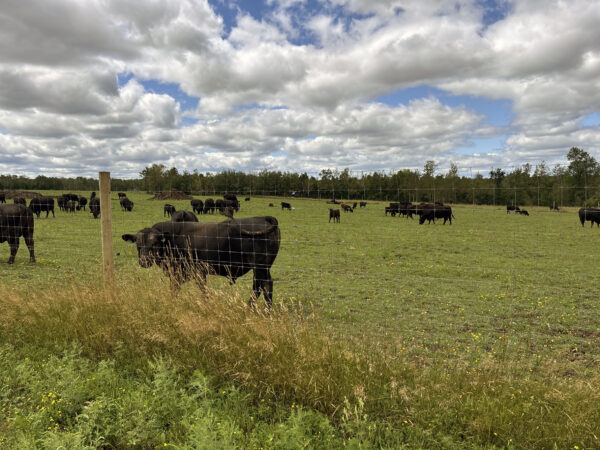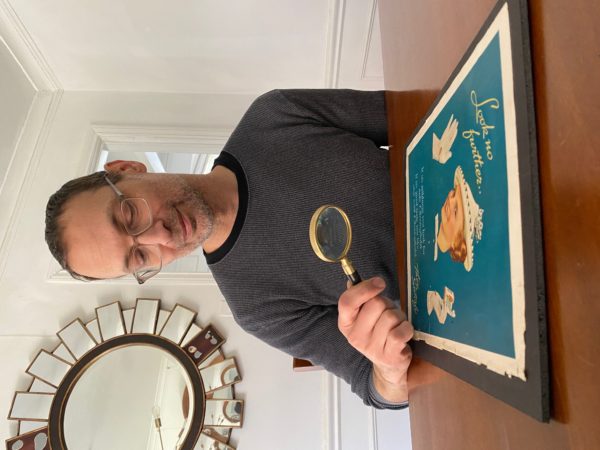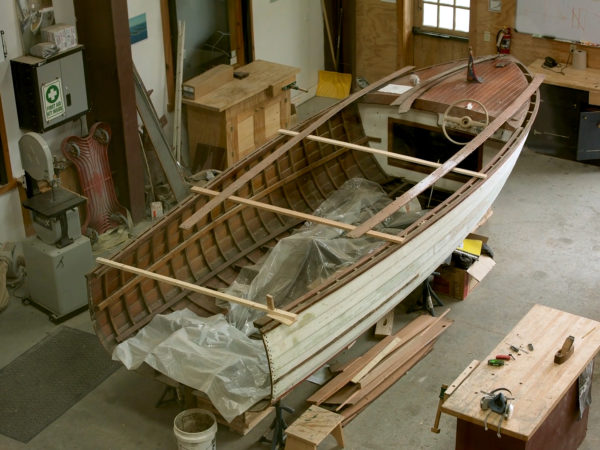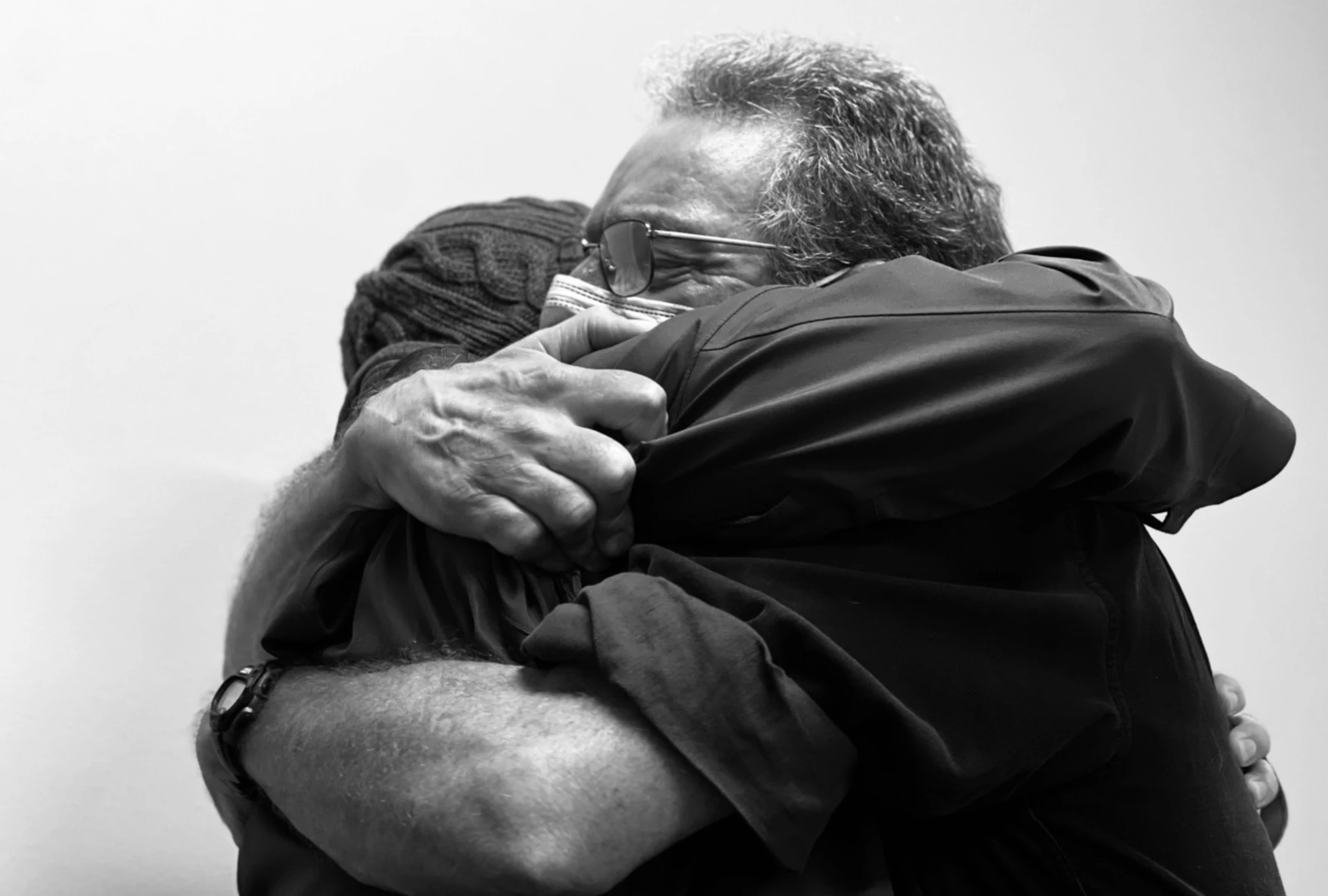
Points North is a biweekly podcast about the land, water and inhabitants of the Great Lakes.
This episode was shared here with permission from Interlochen Public Radio.
On a blustery September day in 2024, 68-year-old David Holtfreter decides to go kayaking in Grand Traverse Bay, Michigan. He looks out at the dark blue water and sees whitecaps on the waves. But David is not too worried about it – he’s been kayaking for about 20 years.
“When I see waves, that’s like my sirens,” he said. “They’re saying, ‘Come on out and play.’”
But things go south quickly. David’s kayak capsizes about 200 yards from shore and he gets battered by wave after wave. He tries blowing an emergency whistle, and waves his paddle in the air to try to get someone’s attention on shore.
I don’t know whether I screamed or whether it was all in my head, but when I went under I said, ‘I can’t die like this,’” he remembered. “‘I don’t want to die like this.’”
Then a random fisherman notices him from shore. He strips down to his boxers and swims out to rescue David.
But in the commotion that follows the rescue, David doesn’t get a chance to thank the stranger. So, he sets out to look for him and find out why the fisherman risked his own life to save him.
CREDITS:
Producer: Michael Livingston
Host: Dan Wanschura
Editor: Morgan Springer
Additional Editing: Ellie Katz, Ed Ronco, Peter Payette, Claire Keenan-Kurgan
Music: Blue Dot Sessions
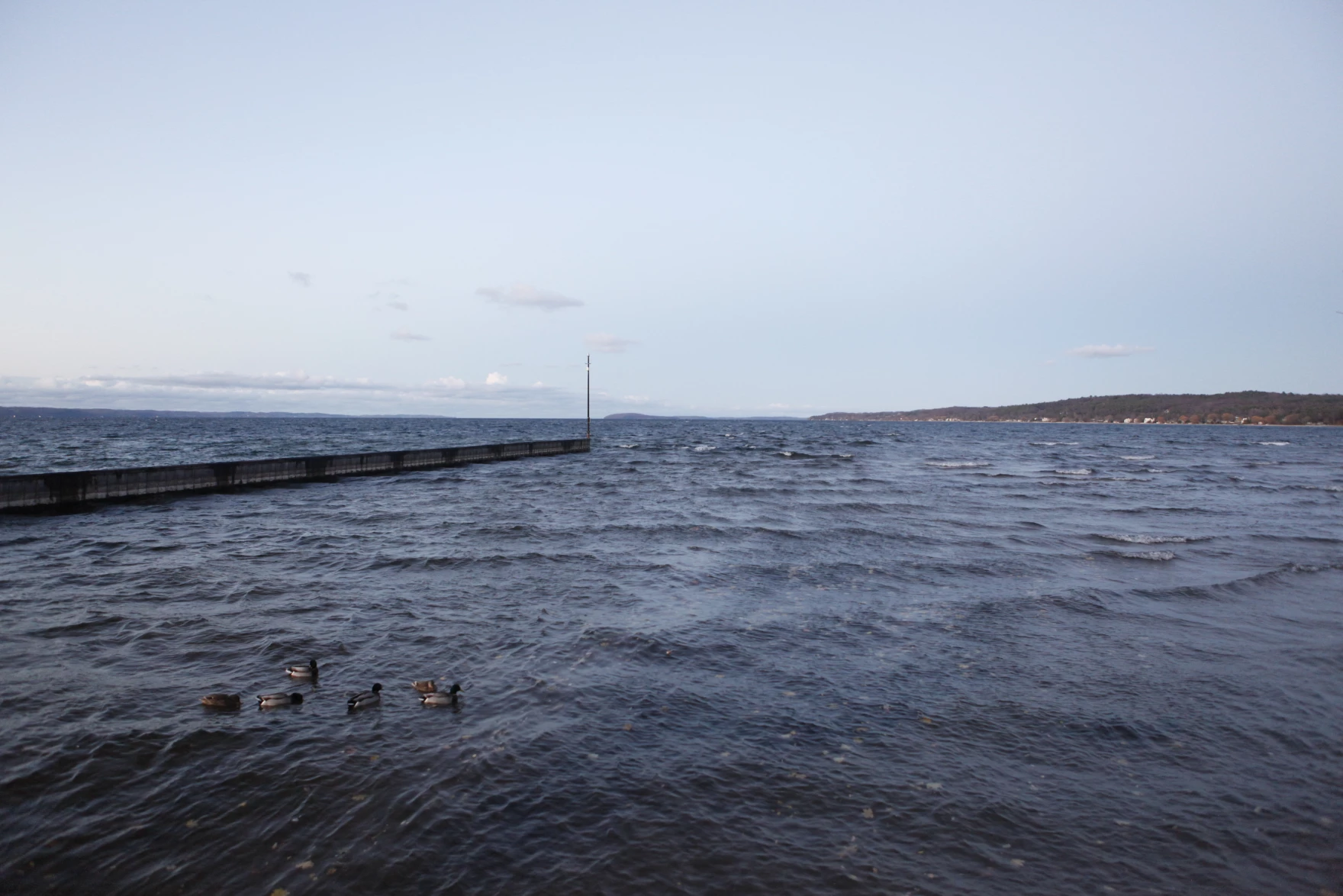
Grand Traverse Bay in Lake Michigan. This is the area where David Holtfreter was kayaking when he capsized about 200 yards from shore. (Photo Credit: Dan Wanschura/Points North)
TRANSCRIPT:
DAN WANSCHURA, HOST: This is Points North, a podcast about the land, water and inhabitants of the Great Lakes. I’m Dan Wanschura.
This is a story of a man who almost died and the search for his rescuer. The man’s name is David Holtfreter. He’s 68, retired, and lives in Traverse City, Michigan. David’s a sweet guy with great manners. And one of his big hobbies is kayaking – just being on the water.
DAVID HOLTFRETER: I’ve been around water all my life. I’ve just loved it. In fact, I tell people if you look closely on my neck you can see gills.
WANSCHURA: One day this September, David decided to go for a paddle in Grand Traverse Bay in Lake Michigan.
HOLTFRETER: It was a nice, sunny day, some fluffy clouds, but the winds were coming out of the north about 15 miles per hour. And there were white caps on the waves.
WANSCHURA: This was new for David. He’s got about 20 years of experience kayaking. But not in waves around 3 feet tall.
HOLTFRETER: Yeah, I kind of got excited. I saw the waves, and I thought, ‘Well okay, this is something I’ve never done before.’
Just because you think you can do something doesn’t mean you can. I shouldn’t have been out there. I shouldn’t have been out there.
So I got my boat out, and there were fishermen. I asked him how, you know, how the fishing was, and they said, ‘Well, it’s pretty good. They’re jumping.’ I said, ‘Okay, well, I’ll keep an eye out. Maybe I can catch one while I’m out.’
So, it was fun going out, because you go up the waves, and just as it was beginning to crest, my bow would crash through it.
It was exhilarating and a little bit scary at the same time.
In boating, it’s easier if you face into the waves and so they’re breaking over your bow. You have more control. So, I was doing that.
I got out, oh, maybe 200 yards off the shore, and I thought ‘I better turn around,’ you know? I thought, ‘This is far enough.’
So, I turned my boat around and started what I call wave surfing.
And for a while it went well. I rode half a dozen waves in. The last wave that I rode, I got sideways on.
I started to tip to my right, and so I was leaning to my left, and there was water in the cockpit.
Things slowed down, and I slowly tipped over and was in the water.
It was a warm day, but it was surprisingly chilly. I held on to my paddle and I grabbed the boat as much as I could.
I had been a lifeguard when I was younger. And one of the things that they taught you if you fall over into waves, is that you kick with the waves and use the wave’s momentum to help you propel yourself towards the shore.
So I started doing that. I thought I was doing it right. And as I started swimming in, the waves were going over my head. I had a hat on, and every time the waves would come over, the hat would flap down over my face, and I couldn’t see.
So I was kicking trying to ride the waves in and it wasn’t happening. It wasn’t happening. That’s when I started getting scared.
I was trying to signal with my paddle. I was waving it back and forth and trying to get someone’s attention on the beach.
But with these waves crashing over me, I couldn’t get enough breath.
The third or fourth time that I was pushed under the water, I was kicking and… I don’t know if I… I’m sorry. I don’t know whether I screamed or whether it was all in my head, but when I went under I said, ‘I can’t die like this. I don’t–. I don’t want to die like this. I don’t want to die. Just keep kicking, keep kicking.’
When I came up, that’s what I remembered. I had a whistle in my vest, and I got it out, and I started blowing that thing. I blew and blew, and I didn’t think anyone could hear me.
I felt I was getting tired. I was getting tired. I didn’t know if I was going to make it into shore.
After a few more times of struggling, I saw this beautiful bald head coming out to me.
He looked at me and he said, “don’t worry, we called the fire department.” I was hoping that I’d be able to stay afloat until they came.
So, he came around to the same side of the boat that I was on. And he grabbed me so hard that he left fingerprints on my arms. And he was looking to make sure I wasn’t going to go under.
When he came up, I said, “What’s your name?” When he first said his name, I didn’t understand it was Hans. I said, “Hand?” I said, “Your name’s Hand?”
And after a while, he said, “David, don’t worry about it. I’ll tell you my name when we get on shore.”
Hans kept on saying, “Just hang on to the boat. Hang on to the boat.” And so, I just put one arm over the boat. I had a death grip on it.
And then, soon after Hans came out, there was another gentleman named Ben Fisher who… he must’ve seen Hans jump in and swim out to me. And he came out after him.
They both disregarded their own safety, and they came out, and they were instrumental in the- They were my life savers.
We were all hanging onto the capsized boat, riding the waves. We saw this– off to the right– there was this… I think it was a 30 or 40-foot catamaran, and he was motoring from the marina when he saw us floundering in the water.
He came and maneuvered that thing around.
We were at the ladder in the back. And Ben pushed me towards the ladder and he said, ‘Climb up. Climb up the ladder.’
I was tired, so I didn’t have the strength to pull myself up.
His first mate grabbed the two straps on my shoulders and just lifted me up and onto the back of the boat.
And we got to the dock. There were fire department and emergency rescue people on the dock. There were a bunch of people on the shore, and they started clapping.
They carried the football, which was me, over the goal line, and they made a touchdown. They saved my life.
I didn’t get to see Hans before they put me into the ambulance, and I was sad about that, because I didn’t get a chance to thank him for rescuing me.
I’ve never had anyone save my life before, so I don’t know what to compare it to. Hopefully you’ll never find out, but if it does, you’ll understand that what the… what the desire and what the need is to just thank them properly.
WANSCHURA: But David realizes he doesn’t know Hans’ last name. He really doesn’t know much about the guy – and he’s not sure how to find him. He says he feels incomplete until he can thank him in-person. So, when he leaves the hospital, David tries hard to find Hans. And our reporter Michael Livingston helps him in his search. That’s after the break.
(sponsorship message)
MICHAEL LIVINGSTON, BYLINE: Finding Hans was not easy. David really only had two things to go off: a first name and a bald head. We started the search by requesting the police report from that day. But that would take a while to come. While we waited, David did get one lead. After he was treated for hypothermia, he got picked up by his sister Katie… who was obviously worried sick.
KATIE HOLTFRETER: As soon as I saw he was okay, it’s like, ‘Okay, he’s all right. Now, what happened?’ Typical sister reaction.
LIVINGSTON: David tells Katie the story with vivid detail.
KATIE: The fact that this guy did not even hesitate. He was just in the water and swimming, and I just thought, ‘Oh, God bless him.’
LIVINGSTON: Katie starts sharing the story with other people. Partly because she wanted to help David find Hans, but also because it was a crazy experience.
KATIE: I have a couple friends that I hang out with a lot, and I was over there, and I was telling them what had happened to David. And I got done with the story, and I said, ‘And all I know is this one guy, he’s bald, and he’s a really good swimmer, and his name is Hans.’ Now, I mean, how many Hans can there be in Traverse City? I said it kind of facetiously.
LIVINGSTON: How many bald Hans can there be in Traverse City, right?
KATIE: Exactly! But my one friend looked at me, and she said, ‘I know Hans who’s bald, and he teaches over at Northwestern.’ I said, ‘You’re kidding me?!’
LIVINGSTON: Northwestern Michigan College is a community college in town, just a couple minutes away from where David almost drowned. So I looked up this guy and emailed him… almost positive this was the Hans we were looking for. He responded a few days later.
“Hi Michael… This was not me. But I am glad that David is ok and that a ‘Hans’ helped him out.
There are two other Hans that I know in the TC area.
Maybe it was one of these guys… Thanks for reaching out… Hans.”
Attached were a couple of LinkedIn pages. And to my surprise, another bald Hans popped up on my screen. I called some phone numbers connected to him until…
LIVINGSTON: Hey
HANS SCHOONOVER: Hey
LIVINGSTON: Are you the one who saved David in the bay a few weeks ago?
SCHOONOVER: Yes! Sure, yes I am. If you wanna say I saved him.
SCHOONOVER: My name is Hans Schoonover and the day that this event took place I was with my son Elijah. We went down there to see if we could get some of the salmon that were starting to head up-river.
There were huge waves, like there was this really brisk north wind. The waves were just pounding in, lots of white caps, gusting wind. We couldn’t see any fish and there were a few other people fishing down there but we were just hoping to get something.
I had just got Eli’s lure tied on for him, and I was just starting to tie my lure on. And while we were getting ready, I kept hearing this high pitched sound.
But in my head, I was telling myself, it’s kids playing.
And Eli said, Hey, Dad, what’s that yellow thing out there? Is that a kayak flipped over? And immediately, I knew right away that it was a warning whistle. And I stood up and I looked out, and I could see… there was indeed a kayak that was flipped upside down. Someone was clinging to the bow, and they were blowing a whistle. And I immediately said to Eli, tell those guys down there that there’s a kayaker flipped over, and that I’m going out.
I started to take my clothes off and put down my gear to go out. And Eli went to tell them, and they came over and they said, ‘We’ve called 911, and they’re on their way, but you shouldn’t go out there. It’s too dangerous.’ And I thought about it.
I had water rescue training when I was young in the Boy Scouts and I understood, you know, people who are out there, and they’re panicking, they might try to clamor on top of you. And I was like, ‘Yeah, he’s a ways out there, and it’s really wavy.’
This person is clinging to this kayak thing, but they’re being beat up by the waves, and I don’t know what’s going on. I don’t know how bad they are. And for a minute I thought, ‘You know, maybe they’re right.’
I understood the dangers, but it seemed like forever, but he kept blowing the whistle as we were waiting, and I just decided it must have been like 30 seconds, I was just like, ‘I can’t wait anymore. This… this person out here, they’re scared, and they’re blowing a whistle, and they want someone to come help them. And I can do it.’
I stripped down to my boxers, and I went out. I just started wading out into the waves. And I just kept thinking, ‘I can get to him. I’ve got to get to him.’
The waves were really big and a couple of them went over my head and water went up my nose. And it’s got that smell of water when it gets in your nasal passage. And I thought for a split second, ‘This is how people die.’
As I was heading out, I could see another guy on the shore getting ready to come out and follow me, and that made me feel– it bolstered my courage and helped me feel a lot safer and relieved.
I kept going and I finally got to him. His life jacket was slipping, and he was just exhausted. He was terrified, and … I didn’t know how long he’d been like that.
When I got to him I said, ‘You’re okay. The fire department has been called and they’re on the way, and you’re going to be alright!’
Even though we were only out there for a short period of time, it seemed like we bonded pretty damn fast. I thought, ‘Wow, this is an experience that I don’t think anybody, any of us, are going to forget.
LIVINGSTON: But why did you choose to do it? Why did you jump in?
SCHOONOVER: I’ve been helped a lot in my life. I’ve been loved a lot. People have really taken the time to help me out of situations where I needed help, even when I didn’t realize I needed it. Maybe that’s what encouraged me to move on acting to help David. Maybe people who have been pulled out of tough situations, recognize the value of what it feels to have somebody reach out to you.
LIVINGSTON: David really wants to thank you in person. Would you be up to that?
SCHOONOVER: Sure.
LIVINGSTON. Alright.
SCHOONOVER: I’d love to see him.
LIVINGSTON: Alright.
LIVINGSTON: So, the three of us set up a time to meet at the local library. David and I arrive first.
HOLTFRETER: Oh here he is. See, this is what I look like all dry!
SCHOONOVER: Me too! Good to see you!
HOLTFRETER: Good to see you too! I was getting ready to give up, and you came at the right time. Bless your heart. Just seeing you, I’ll start crying again. … That head came out, and the sun was glaring off it.
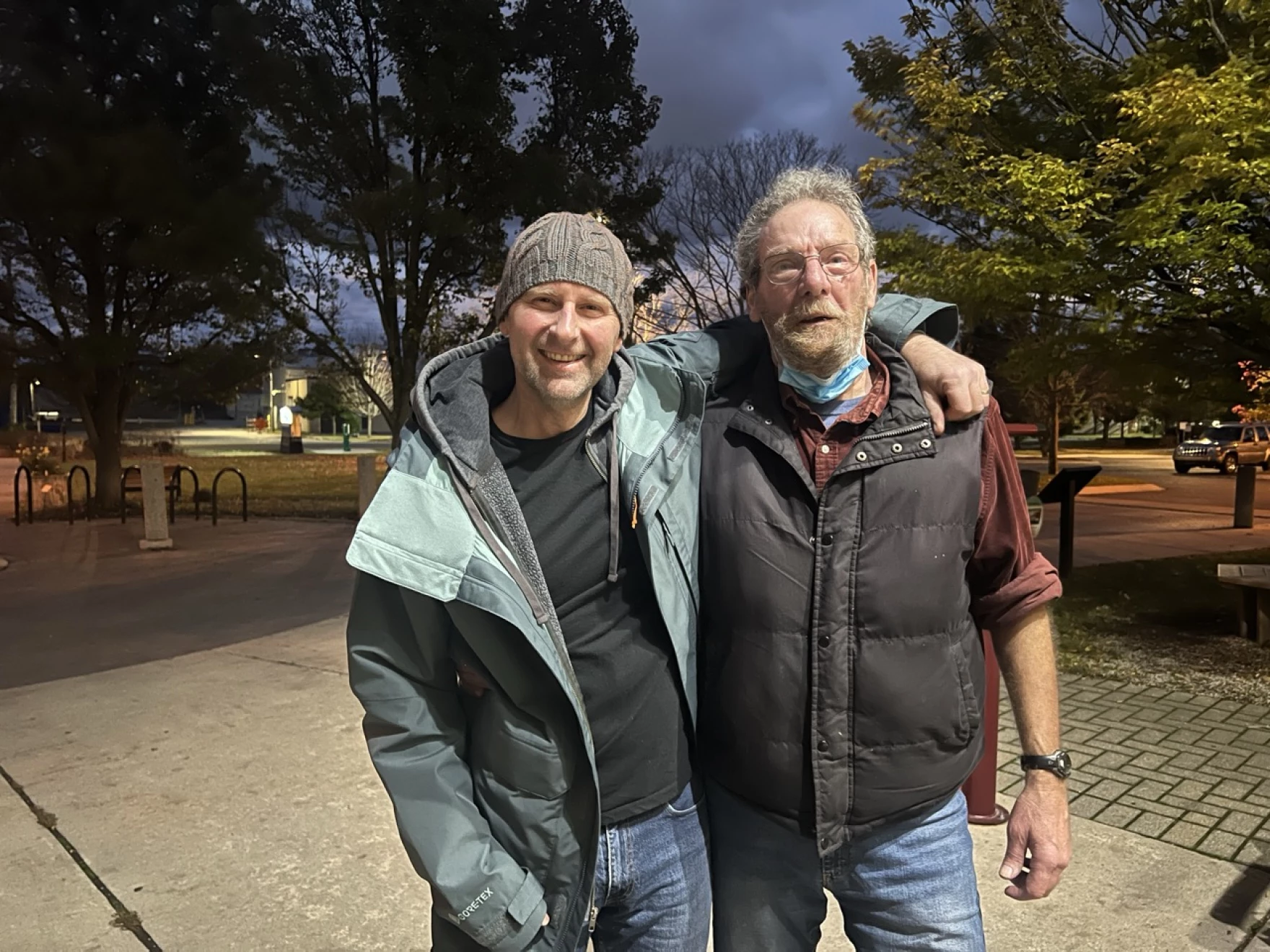
Hans Schoonover (left) and David Holtfreter pose for a photo together after meeting. (Photo Credit: Michael Livingston/Points North)
LIVINGSTON: Is there a lesson that you want somebody else to take away, or just something that is going to be in your mind as you move throughout the rest of your life?
SCHOONOVER: Knowing that you can make a big difference in someone else’s life by taking some action, that’s what I took away from this. And I look forward to more opportunities to do that.
HOLTFRETER: Whether you think so or not, you risked your life to come out and save mine.
SCHOONOVER: It was a calculated risk!
HOLTFRETER: Well, you were a good swimmer, you knew you were a good swimmer.
HOLTFRETER: Opportunities happen all the time in our life to help someone and sometimes we recognize them and sometimes we don’t … and the opportunities that we do have. Sometimes it’s as simple as opening the door for someone, or picking up something that someone dropped. … It doesn’t have to be grandiose like what Hans did – saving my life. But the little things add up. Makes the world a little bit better for everyone else.
Catch more news at Great Lakes Now:
Presenting Atlas Obscura: The Mysterious Sinkholes of Mount Baldy
Points North: The Biggest Buck That Maybe Never Was
Featured image: David Holtfreter (right) and Hans Schoonover share an embrace. This was the first time the two met since Hans rescued David in Grand Traverse Bay in Lake Michigan. (Photo Credit: Michael Livingston/Points North)


